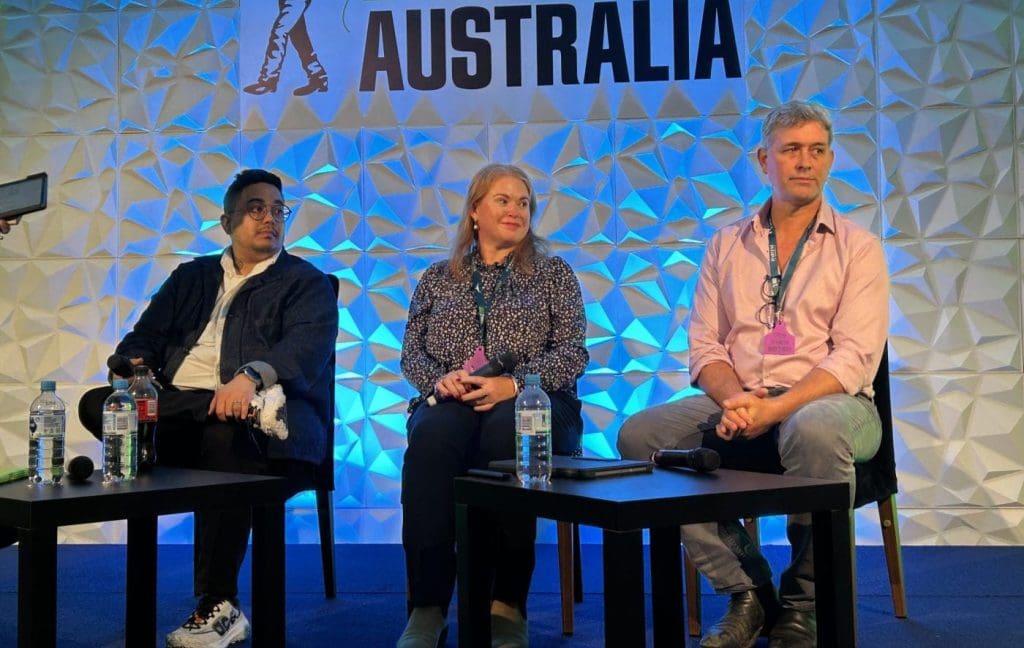
Left to right David Inderias, Bindi Turner and Brad Wheaton at last week’s seminar
EXPECT more superannuation funds and institutional investors to back natural-capital-based agriculture, but also be ready to be told how to farm, says a beef fund manager who has been delivering double-digit returns to his investors.
Gunn Agri Partners co-founder and managing director Brad Wheaton told a large audience at Beef 2024 last week that institutional investors are bringing new requirements with their capital inputs.
“The strategies that we will manage in the future will not just be managing for income or capital growth, there’ll also be managing carbon credits and biodiversity,” he said.
The company counts among its investors and shareholders the Federal Government’s Clean Energy Finance Corporation and a Canadian pension fund.
“The interest of the Clean Energy Finance Corporation is a great example of how investors with institutional capital are demanding commercial returns and calling on investment managers like us – and the industry more broadly – to deliver outcomes associated with natural capital and carbon,” he said.
Over the past three years, Gunn Agri has increased assets under management by $500 million in agricultural investments, aiming for commercial returns, decarbonsation and other sustainable land management initiatives. The Gunn portfolio spans 2.6 million acres and $800m in assets under management across Queensland, notably its pastoral company Cunningham Cattle Co, which has delivered a great outcome for investors, Mr Wheaton said.
“We went to investors ten years ago with this model saying we believe we can generate returns of between 11pc and 13pc. We‘ve made cash distributions back to the investors … and our performance to date is at the upper end of that,” he said.
“There’s been volatility and in the past 20-30 years there’s been a period of low investment from the Australian superannuation funds, particularly in the beef industry. But there’s been a big change in that these superannuation funds … they have members and those members have a voice. And they are increasingly calling for sustainability and investments in nature. Mums’ and dads’ money coming into beef in an institutional way, that is something I think we will see in decades to come,” Mr Wheaton said.
“It’s a whole new wave of investors that are interested in that opportunity. And if there’s one thing that we’ve seen it’s been an appetite from players that we didn’t expect.”
New players brought new challenges as well as new opportunties, he said.
“To touch on something a bit contentious – the debate that seems to rage on in our industry specifically about methane emissions and how you calculate and account for those. That’s a hearts-and-minds debate that has to happen.
“But there’s also a reality and that’s essentially that a lot of the institutions that provide capital for agriculture have that expertise in-house. They have formed a view and they will ask you to do something,” he said.
Mr Wheaton shared some predictions for future investment in sustainable agriculture by forecasting that mixed environmental plantings will replace large scale reforesation.
“One thing that we’re seeing when we’re evaluating investment opportunities is that on the east coast, the modelling for diverse environmental plantings is very competitive with grazing operations,” he said.
“The other thing that we’re seeing is those models that dominate the landscape are not only unpopular with people who run the local footy team, but they’re also unpopular with the proponents and so that’s a take-away for us; that we are seeing more intelligent design – particularly in these plantings projects.”
There was also a new ownership model emerging, where cattle and land are decoupled, he said.
“What we’re seeing is the change in institutional investors saying that they want to have exposure to owning land that capable of generating natural capital assets that have a tangible value, but in a way where they don’t own the livestock.
“And when you think about it, that could create a great opportunity for entrepreneurial, innovative operators in this space.”
“It’s been one of the changes that we’ve witnessed first-hand, where investors are really helping to shape the opportunities. And we see this as a trend that will continue.”
Nature Repair Act
Both Mr Wheaton and fellow speaker Bindi Turner expressed doubts about the proposed Natural Repair Act which could offer payments for restorative agriculture.
Ms Turner, chief investment officer of Impact AG Partners, said: “I think there is still a little bit more to play out there. I think the Nature Repair Act, especially in Queensland, is a challenging concept. I think agriculture needs to make sure that it is part of the conversation and that it is providing the good science. I think well get the Nature Repair Act will get to a place where there will be stewardship payments as part of a natural capital monetisation concept.
Mr Wheaton suggested that agriculture needed to get involved in the conversation, saying: “Look at the water market. I don’t think there are a lot of happy people, even from the environmental users who would say that’s been done well.”
Betting on the farm
Risk around carbon capture schemes could fuel a futures market and even a betting platform, according to an AI and data integration expert addressing the forum.
David Inderas, chief executive of Fresh Supply Company said: “In five to ten years the markets are going to be a lot more efficient, they are going to be a lot more liquid, so you’re going to see the financialisation of these things.
“You’re going to see bonds, you’re going to see financial instruments, you’re going to get debts placed. Simple tools like bonds and futures, they will become more and more prevalent.
“People will make bets for (the price) to go up and down, and then I think the key word will be liquidity.”
He predicted that, as the market matures incorporating newer technology and more shared data, costs of compliance will reduce.
